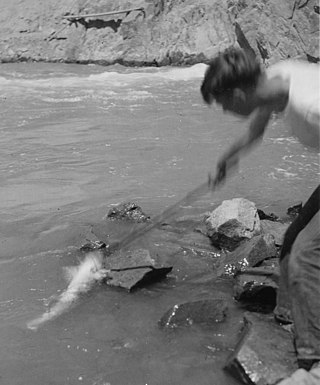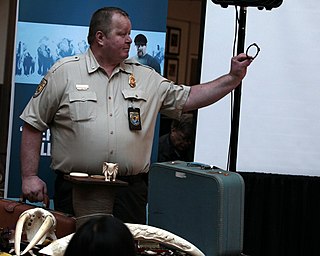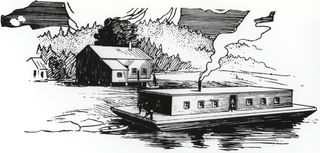
Fishery can mean either the enterprise of raising or harvesting fish and other aquatic life or, more commonly, the site where such enterprise takes place. Commercial fisheries include wild fisheries and fish farms, both in freshwater waterbodies and the oceans. About 500 million people worldwide are economically dependent on fisheries. 171 million tonnes of fish were produced in 2016, but overfishing is an increasing problem, causing declines in some populations.
The Environment Agency (EA) is a non-departmental public body, established in 1996 and sponsored by the United Kingdom government's Department for Environment, Food and Rural Affairs, with responsibilities relating to the protection and enhancement of the environment in England.
Fisheries and Oceans Canada is a department of the Government of Canada that is responsible for developing and implementing policies and programs in support of Canada's economic, ecological and scientific interests in oceans and inland waters. Its mandate includes responsibility for the conservation and sustainable use of Canada's fisheries resources while continuing to provide safe, effective and environmentally sound marine services that are responsive to the needs of Canadians in a global economy.

The Atlantic salmon is a species of ray-finned fish in the family Salmonidae. It is the third largest of the Salmonidae, behind Siberian taimen and Pacific Chinook salmon, growing up to a meter in length. Atlantic salmon are found in the northern Atlantic Ocean and in rivers that flow into it. Most populations are anadromous, hatching in streams and rivers but moving out to sea as they grow where they mature, after which the adults seasonally move upstream again to spawn.

Snagging, also known as snag fishing, snatching, snatch fishing, jagging (Australia), or foul hooking, is a fishing technique for catching fish that uses sharp grappling hooks tethered to a fishing line to externally pierce into the flesh of nearby fish, without needing the fish to swallow any hook with its mouth like in angling. This is achieved by suddenly and vigorously pulling the line when movement is felt, causing the snag hook to "claw" into any fish unfortunate enough to be grappled by the hook points. Weighted multi-hook rigs can be used to increase chances of success, and modern technologies such as underwater video camera can also be used to visually aid and time the snagging.

The Scottish Fisheries Protection Agency (SFPA) was an Executive Agency of the Scottish Government. On 1 April 2009, the Scottish Fisheries Protection Agency and Fisheries Research Services were merged with the Scottish Government Marine Directorate to form Marine Scotland, part of the core Scottish Government.

The fishing industry in Scotland comprises a significant proportion of the United Kingdom fishing industry. A recent inquiry by the Royal Society of Edinburgh found fishing to be of much greater social, economic and cultural importance to Scotland than it is relative to the rest of the UK. Scotland has just 8.4 per cent of the UK population but lands at its ports over 60 per cent of the total catch in the UK.
A water bailiff is a law-enforcement officer responsible for the policing of bodies of water, such as river, lake or coast. The position has existed in many jurisdictions throughout history.

A wildlife inspector is a person empowered by law to protect wildlife.

The coastline of the Russian Federation is the fourth longest in the world after the coastlines of Canada, Greenland, and Indonesia. The Russian fishing industry has an exclusive economic zone (EEZ) of 7.6 million km2 including access to twelve seas in three oceans, together with the landlocked Caspian Sea and more than two million rivers.

The Scottish Government's Marine Directorate is responsible for managing Scotland's seas and freshwater fisheries along with delivery partners NatureScot and the Scottish Environment Protection Agency.

The Marine Management Organisation (MMO) is an executive non-departmental public body in the United Kingdom established under the Marine and Coastal Access Act 2009, with responsibility for English waters. The MMO exists to make a significant contribution to sustainable development in the marine area, and to promote the UK government's vision for clean, healthy, safe, productive and biologically diverse oceans and seas. The MMO aims to focus all of its activities and resources to meet its mission of enabling sustainable growth in the UK's marine area through 5 strategic outcomes:
Fisheries Act is a stock short title used for legislation in multiple countries relating to fisheries. The Bill for an Act with this short title will have been known as a Fisheries Bill during its passage through Parliament.

Canada (AG) v British Columbia (AG), also known as the Reference as to constitutional validity of certain sections of The Fisheries Act, 1914 and the Fish Canneries Reference, is a significant decision of the Judicial Committee of the Privy Council in determining the boundaries of federal and provincial jurisdiction in Canada. It is also significant, in that it represented a major victory in the fight against discrimination aimed at Japanese Canadians, which was especially prevalent in British Columbia in the early part of the 20th century.

Fisheries law is an emerging and specialized area of law. Fisheries law is the study and analysis of different fisheries management approaches such as catch shares e.g. Individual Transferable Quotas; TURFs; and others. The study of fisheries law is important in order to craft policy guidelines that maximize sustainability and legal enforcement. This specific legal area is rarely taught at law schools around the world, which leaves a vacuum of advocacy and research. Fisheries law also takes into account international treaties and industry norms in order to analyze fisheries management regulations. In addition, fisheries law includes access to justice for small-scale fisheries and coastal and aboriginal communities and labor issues such as child labor laws, employment law, and family law.

A fishing license (US), fishing licence (UK), or fishing permit is an administrative or legal mechanism employed by state and local governments to regulate fishing activities within their administrative areas. Licensing is one type of fisheries management commonly used in Western countries, and may be required for either commercial or recreational fishing.

The Salmon and Freshwater Fisheries Act 1975 is a law passed by the government of the United Kingdom in an attempt to protect salmon and trout from commercial poaching, to protect migration routes, to prevent willful vandalism and neglect of fisheries, ensure correct licensing and water authority approval. This helps to sustain the rural inland freshwater fisheries industry, which employs around 37,000 people in the UK.

The Salmon and Freshwater Fisheries Act 1923 was an act of Parliament passed by the United Kingdom Government which attempted to consolidate fishery legislation, which at the time consisted of the Salmon Fishery Act 1861 and 18 amending Acts which had been passed subsequently.

Freshwater eel poaching and smuggling have emerged in recent years as a direct response to the sustained popularity of eels as food combined with the eels' low population, endangered status, and subsequent protections. Freshwater eel are elongated fish in the Anguillidae family of ray-finned fish. The three most commonly consumed eel species are the Japanese eel, European eel, and American eel.

The Fisheries Act is legislation enacted by the Parliament of Canada, governing the powers of government to regulate fisheries and fishing vessels. The act has been undergoing major regulatory revisions in recent years, including those attached to treaty rights of Miꞌkmaq in Atlantic Canada. The Minister designated under the Act is the Ministers of Fisheries, Oceans and the Canadian Coast Guard.
















